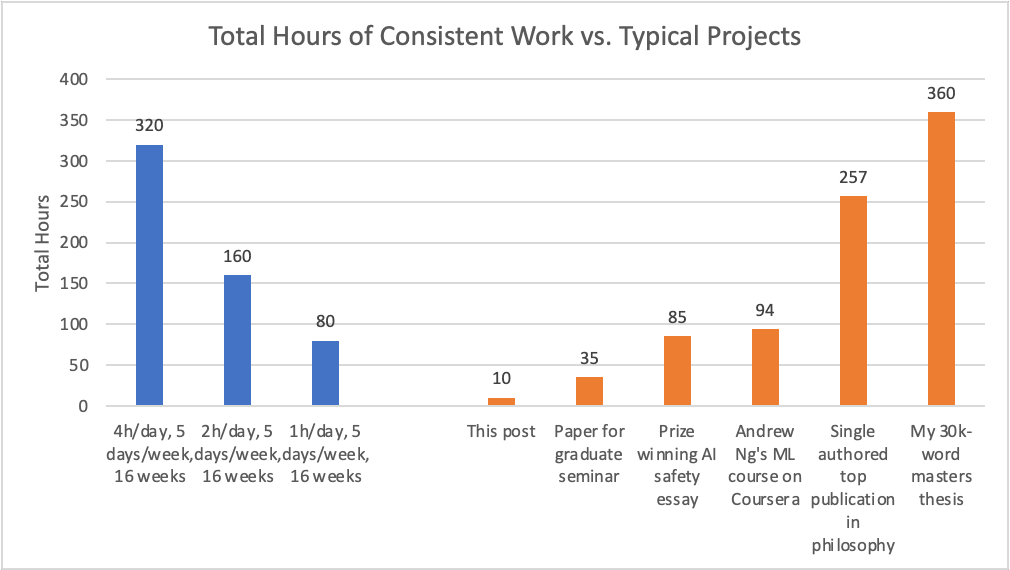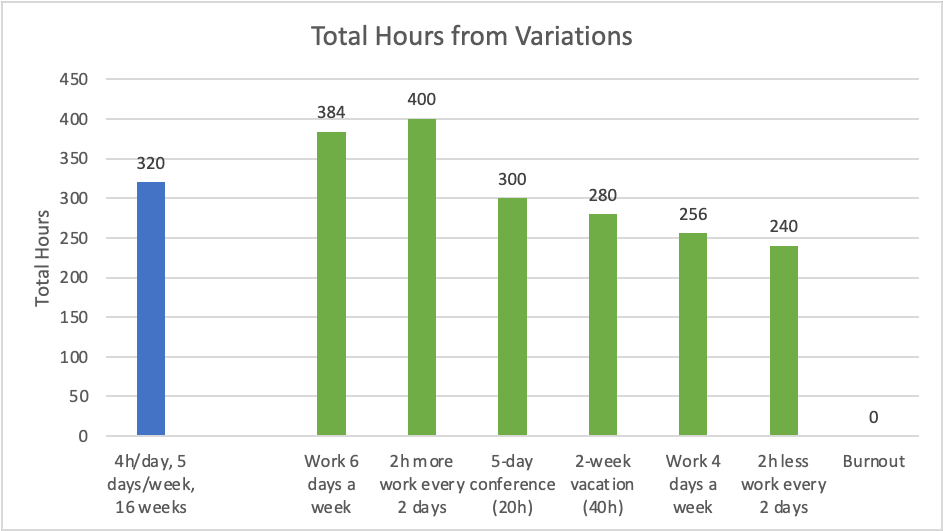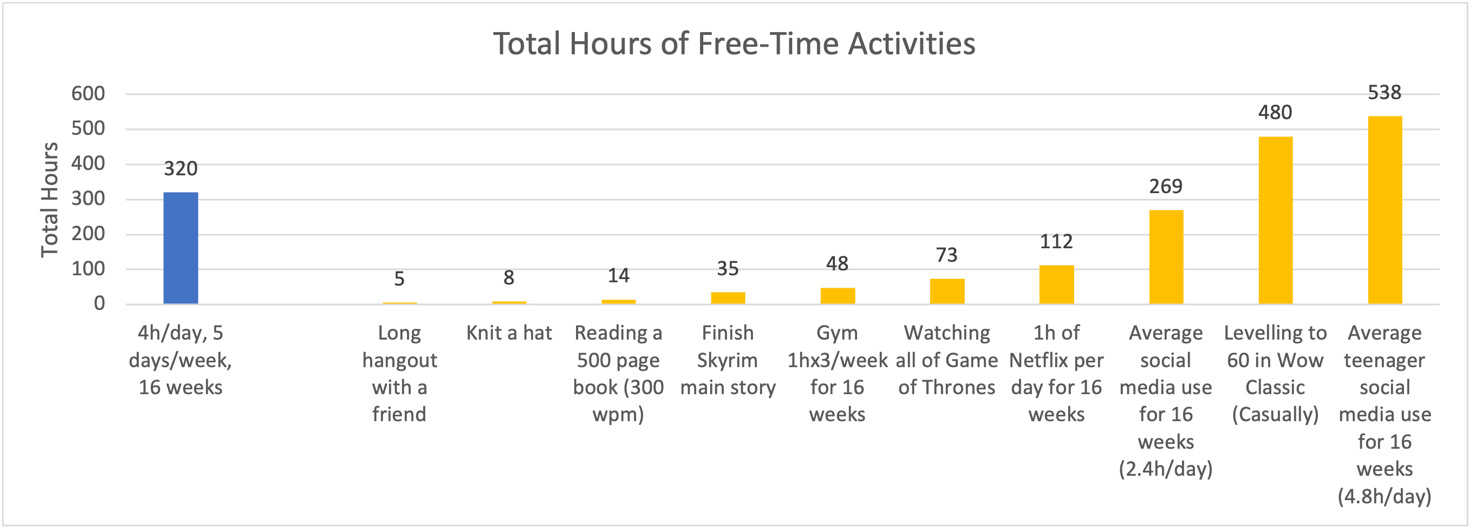tl;dr: I compare the total work hours produced from working 4h/day or less to the total hours required for relevant projects.
Valuing time concretely
Many of us aspire to devote as much time as we can towards our main goals. However, among those of us who primarily work on long-term projects with little regular feedback, I think it’s rare to have a precise sense of what we’re getting for each hour devoted. For example, I expect few researchers could say with any confidence what the concrete result would be of working one more hour per day for a month.
If correct, this is surprising for the same reason that it would be surprising if a professional athlete had only a vague sense of the effect of a workout and the calories of their diet. With more precise information, they would likely find ways to improve their results with less cost. Furthermore, it plausibly helps motivation to know what each hour spent gets you if used well. I’d speculate that much procrastination can be attributed to a vague grasp of what an hour of work produces, which is often only made concrete by an impending deadline. This pattern seems to often produce stress, guilt, and in the worst case burnout, especially when the work is higher stakes.
In an attempt to make the value of my own time more concrete, I tried to figure out what I should expect to get done if I worked 4 hours per day for some period of time. I found the results valuable and wrote up this post to share them in case anyone else would benefit as well. In what follows, I estimate the total hours gained from a period of consistent work and compare this to estimates of the total hours required to complete a range of (to me) relevant projects. I then check how these results are affected by variations, such as working more or taking a break. Finally, I compare the numbers to other common leisure activities.
These are very simple calculations that anyone could do, and I expect that many will have done for themselves already. However, I couldn’t easily find something written on it, so I thought it would be worth sharing. The post is primarily applicable to someone in a position similar to mine (PhD student in philosophy), but I expect that it is somewhat useful to others too, especially students and independent researchers.
Set-up
Let’s start by calculating the total work hours we would get from a period of consistent effective work. By effective I mean mostly undivided attention (e.g. the level of concentration one might have playing a slow strategy game), meaning that working while checking social media regularly plausibly disqualifies it for most people. For those thinking in terms of pomodoros, I’m taking 1 hour to be 2 pomodoros.
I will use 16 weeks as the default period of comparison. This is a standard length of a university term which makes it a natural way to chunk periods for me, and I imagine many other readers. I also think it is a nice period to compare many longer projects to. Finally, assuming 4 weeks of vacation, it’s 1/3 of the work year, which makes it easy to scale.
How many hours of work per day should we be considering? It is tempting to focus on the 8h/per day of the standard workday. However, few people can work efficiently for 8h or do 16 pomodoros per day, at least consistently for extended periods. I for example have only successfully done so a handful of times during very busy periods. In further support, this survey suggests that the average office worker in the UK works efficiently 2h and 53min per working day on average. (Admittedly, this survey doesn't exactly look peer-reviewed, and should probably be taken with a grain of salt).
Instead, my default assumption will be that we are working 4h/day, 5 days a week. This is a number that I think requires effort to meet, but that many people can do. For example, one might have a 2h working block in the morning, and one 2h block in the afternoon or evening. However, even this might be difficult for people with other obligations, so I will also compare the result of working 2h/day, and 1h/day (e.g. for dedicated writing). Later, I consider how common variations to these assumptions affect the total output.
Hours generated from consistent work
How many total hours of work do we get from working 4h/day, 5 days a week for 16 weeks? The answer is 320 hours. It is difficult to have a sense of how much this is, so let us compare it to estimations of the total hours required to complete some typical projects:

This is a pretty random sample of projects that were somewhat easy for me to get data on. I had data on how long it took me to write a mediocre paper for a graduate seminar and an essay of mine that won a final prize in the AI alignment awards. The number of the ML course is just taken from the Coursera website, but it broadly matches my estimates of the time similar in-person courses have taken me. The top publication (published in top-3 philosophy journal) number is from a friend who tracks all of their worked hours and was kind enough to share this with me. I expect that this number can vary quite a lot between people and that for some it might be significantly lower I also included the time I put towards my BPhil thesis at Oxford (which in hindsight could probably have been put to better use).
There is obviously more work that can be done in sampling projects for their total required hours. If anyone wants to share their own estimations in the comments, I’d be happy to update the post with more examples.
My primary takeaway from this is that consistent work is more valuable than I would have intuitively expected. For example, it is noteworthy to me that a skilled person working 2h/day and taking weekends off—which to me seems lower than the time most academics, for example, devote to their work—should expect to produce around 2 very good publications a year. I’m relatively confident that in philosophy, that would be in the upper quartile of output among professors. (Note that the average publication rate can vary heavily across fields, e.g. due to norms of copublishing).
This suggests to me that it is a much more common failure mode to devote a lot of time to a project and use it ineffectively than it is to devote too little time to it. As a supporting case study, the friend whose data I received above worked on average almost exactly 2h/day on the days they worked, and worked around 60-80% of the days of the year, depending on the year. However, with this work, they managed to be one of the most productive young scholars that I personally know. In other words, it seems one can meet a pretty high bar by consistently working few hours and not even permitting oneself to work more.
Variations
What happens if you vary the assumptions above? For example, how much is gained from working more? And how much does one lose from taking a vacation? Here are some examples of variations and interventions next to the 4h/day, 5 days a week, 16-week duration baseline.
These examples are what I imagine to be pretty typical and realistic scenarios that people might consider. For the “2h more every 2 days” I’m imagining working 6h/day 2 or 3 days a week, and analogously for working 2h less every 2 days. I imagine that a 5-day conference takes 5 work days (it might be less if it’s on a day you wouldn’t have worked, but my experience is that neglected obligations usually take a day to catch up on anyway), and a 2 week vacation takes 10 work days. I assume that burnout means no productive work during that period. Realistically, burnout can plausibly last much longer than a term, meaning that the cost would be much greater than indicated here.
What is noteworthy to me about this is the relatively low marginal value of working more, within realistic bounds. For example, I have noticed that adding 2h extra work per day, even if it’s only every other day, is rather difficult for me. In particular, the risk of my schedule breaking and me procrastinating because I feel less urgency both go up significantly, which I expect outweighs the 25% increase of hours in the scenario where all goes well.
Another observation is the effect of burnout. Even if the risk is low, the disproportionate effect on productivity is so significant that it seems prudent to be very careful to avoid that outcome, even if that means taking an extra 2-week vacation (i.e. lose 40 work hours or a mediocre term paper, if written by me). This seems especially important to remind ourselves of if our work has a potential large-scale positive impact, as I expect that this can add a lot of mental pressure to work more.
One important consideration that this representation of the value of time abstracts away from is the marginal value of the work produced. For example, for a junior academic, the first great paper they produce is likely more important for them than the second, and so on. More generally, I would imagine that for most people getting some work done is much more valuable than doubling that work. This further reinforces the case for working a lower number of hours if that means reducing the risk of doing much less due to severe procrastination or burnout.
I don’t think it’s clear whether there is declining marginal value in someone’s work from an impartial perspective. For example, we might think an important researcher might add nearly as much to the world with their third paper as the first. However, we might also think the person would do the most important work first—for example, if they have a limited amount of good ideas and need to prioritize—meaning additional hours will be spent on less important projects. In the end, this is plausibly something to be judged on a case-by-case basis.
Leisure
One of the benefits of working fewer hours is having more time to spend on other activities we enjoy, and I decided to do some estimations of common leisure activities too. I did this mostly because it was fun and easy, but also because it provides some further context to the numbers above and might help us judge which activities are the most relaxing, enjoyable, and rewarding in proportion to the time they occupy (because, yes, effective fun is the best fun.) Here are some examples I found, again compared to the 4h/day, 5 days a week, 16 week reference:
I got most of these estimations from googling around. Importantly, the gym number does not include preparation, transport, and shower. If those are included, I think that number could easily double. Like with the project examples, this list could be expanded to be more representative and helpful.
I don’t have much to comment on this beyond the obvious that most of us were aware of, namely that social media takes time. It does also frighten me a bit how many books young me could have read instead of levelling his undead warlock.
Some personal takeaways and caveats
My intention with this post was to provide some information and simple analysis that anyone could produce but I think few will, and anyone will have to decide what to take away from it if anything. However, in case it’s helpful, I’ll briefly mention how I approach my work in light of this.
I normally try to work 4h/day, 6 days a week when I am not taking time off and don’t have substantial other obligations (e.g. teaching). I rather like what I do, so working an extra day doesn’t feel that costly. However, I benefit a lot from having one day off a week to rest and get perspective on what I am doing. I split my work into 2 blocks of 2h each, which I find is long enough to get into a flow state but short enough that I can still focus. It also makes for easy scheduling which saves some cognitive costs of planning. This is time that I reserve for what I take to be important projects (e.g. research), and not time I use for e.g. answering emails.
These were habits I largely had prior to comparing these numbers. The main update I made from the information here was to not aspire to do more work per day than this. However, if I enter a period of more obligations than I currently have, I would now simply opt to work 2h/day most days.
I want to end with some caveats. Personal preferences might substantially affect how it makes sense to work. For example, someone might prefer to work longer but more relaxed hours than the level of concentration assumed here. Or by contrast, someone might prefer binge-working many hours for shorter periods. And others might be constrained in how they can approach work by attention-affecting conditions like ADD. None of what I have said here is meant to override such considerations. Whatever your situation, I hope some of this could be of use.
Feel free to share estimates of your own in the comments. I'd be happy to update the post with new graphs with more information, in case that'd be of use.
Update 1: Changed tl;dr to be less prescriptive.



A very interesting post that came just in time for my resolution in 2024, which will be my first year in college. My main worry has been how much I'll have to read, going into the "Great Books" cirriculum; but knowing this post, as well as what a pomodoro timer is, gives me reason to be confident I may well remember years from now. Thank you much for writing this, and Dark Lady watch over you! 😁
Thank you, and good luck with your first year!
Pardon me if I'm missing it, but I can't see a lot about your experience of working 4 hours a day. Like how is that for you? Have you tried working 6 or 2?
I tried avoiding including too much of my own experiences to avoid making the post too idiosyncratic, but I'm happy to elaborate on it!
I haven't had a period of working only 2h consistently, so I don't know how I would feel about that. However, during busy periods (e.g. if I have both teaching and service obligations) I think my main option to this would be to do nothing and then binge work during vacations, which I have done before and I would expect to be more common.
I have had periods of working 6 hours a day pretty consistently. What distinguished these periods I think was that I was very intrinsically motivated about the research and had minimal other obligations to navigate at the same time, so I naturally ended up just thinking about my work most of the time.
Today when I'm in a position with more regular events during my week, I find this harder. If I schedule 6 hours of work a day (which I did for a large part of last year), I often end up with the feeling that I don't have enough time to navigate other things. I have done this for a few weeks for particular projects, but find it difficult to have as a default working aim. I personally found 4h/day somewhat of a sweet spot, and have been doing that consistently for the last few weeks.
With that said, I have pretty low confidence that effective 6h/day cannot be achieved by others. My main aim with this post was to illustrate some ways in which a lower number achieves many of the benefits I was aspiring to with working more, and might at least for some have a substantial marginal impact on the costs of work. More generally, my experiences are obviously personal, and not something I would want people to put too much weight on.
Executive summary: Working consistently for 4 hours per day yields significant output over 16 weeks, comparable to high-impact academic work. Variations like working more provide diminishing returns and increase burnout risk.
Key points:
This comment was auto-generated by the EA Forum Team. Feel free to point out issues with this summary by replying to the comment, and contact us if you have feedback.